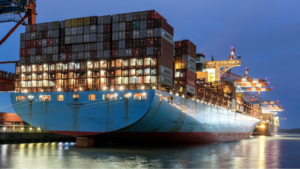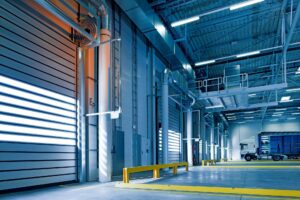Full Truckload (FTL) shipping is a mode of freight transport where a single shipper’s cargo occupies an entire truck trailer. This is especially advantageous for businesses with high volume shipments as it eliminates the need to consolidate cargo with other shipments, optimizing efficiency as the shipper’s goods can be moved in one trip and according to their timelines. Maxing out an entire truck trailer is a cost-effective logistics solution, and can even be competitive with other forms of shipping such as rail or air freight.
Difference Between FTL and LTL
In contrast to Full Truckload (FTL) shipping, Less-than-Truckload (LTL) caters to smaller shipments that don’t require the entire capacity of a truck. LTL consolidates multiple shipments from various shippers, optimizing trailer space and offering a cost-effective solution for businesses with lower volume freight. However, this consolidation results in longer transit times due to multiple stops and transfers.
Key Differences Between FTL and LTL:
| Factor | FTL | LTL |
|---|---|---|
| Shipment Size | Large shipment, enough to fill a truck. These shipments generally weigh more than 10,000 pounds and can go up to 20,000 pounds or more | Small to medium shipment, does not fill a truck. These shipments usually weigh between 150 to 10,000 pounds. |
| Cost | More expensive because you are paying for the entire truck, regardless of whether it is fully loaded or not. | More cost-effective for smaller shipments as you only pay for the space your freight occupies. The remaining space is filled with other shipments, spreading the cost among multiple shippers. |
| Delivery Time | Faster, since the shipment goes directly from the origin to the destination. A better option for time-sensitive deliveries. | Slower with multiple stops and transfers. This can lead to longer and less predictable transit times. |
| Handling | Minimal handling. Loading and unloading once | More frequent, multiple transfers |
| Risk of Damage | Lower, less handling | Higher, more handling |
| Shipping Route | Direct from pickup to delivery | Routed through regional terminals |
| Scheduling | More control over scheduling | Less control, dependent on carrier’s schedule |
| Recommended Industries | Retail, Manufacturing, Wholesale, Food & Beverage | Small businesses, E-commerce, Retail |
These fundamental differences make each mode suitable for specific industries and shipping requirements. FTL is often preferred by retail, manufacturing, food and beverage, as well as wholesale businesses with high-volume or time-sensitive shipments, such as perishables or prepared foods. Conversely, LTL is favored by small businesses, e-commerce retailers, and those with less time-sensitive shipments.
A similar concept applies with ocean freight, where Full Container Load (FCL) shipping mirrors FTL, offering dedicated container space for large shipments, while Less-than-Container Load (LCL) consolidates smaller shipments, akin to LTL.
Advantages of FTL
FTL shipping offers distinct advantages that make it a preferred choice for businesses seeking greater efficiency and security in their logistics operations:
Faster shipment times
FTL allows shipments to follow direct routes from origin to destination, eliminating the multiple stops and delays inherent in LTL (Less-than-Truckload) shipping. With no need to consolidate freight with other shipments, FTL has faster transit times, making it ideal for time-sensitive deliveries.
Flexibility and control
Full truckload shipping gives shippers unparalleled control over their cargo’s journey. Businesses can dictate pickup and delivery times, as well as preferred routes, ensuring shipments arrive precisely when and where needed. Beyond choosing optimal routes, businesses can also choose how they wish to load and unload their cargo, which is not available in LTL shipping.
Reduced risk of damage
Since FTL freight remains on the same truck throughout its journey, goods are only handled during loading and unloading. This reduced handling translates to a lower risk of damage, making FTL a preferred choice for fragile or high-value goods. The exclusive use of the trailer also enhances security, minimizing the potential for theft or loss.
Types of FTL Trucks
Full Truckload (FTL) shipping uses a variety of specialized trucks, each designed to accommodate specific cargo types and meet freight or logistics requirements:
- Dry vans: These enclosed trailers are the most common type of FTL truck, suitable for transporting non-perishable goods that don’t require temperature control. They offer protection from weather elements and are ideal for palletized cargo, boxed goods, and manufactured products.
- Flatbeds: These trailers feature an open platform without sides or a roof, making them ideal for hauling oversized or irregularly shaped cargo that cannot fit in enclosed trailers. They are commonly used for transporting construction materials, machinery, and industrial equipment.
- Refrigerated trucks (Reefers): Reefers are equipped with temperature-controlled systems to maintain specific temperature ranges throughout the journey. They are essential for transporting perishable goods such as food, pharmaceuticals, and other temperature-sensitive products.
- Tanker trucks: These specialized trucks are designed for the safe transportation of bulk liquids, including chemicals, petroleum products, and food-grade liquids. Their design ensures the integrity and safety of the cargo during transit.
- Car carriers: Car carriers are specifically built for transporting multiple vehicles simultaneously. They feature ramps and secure tie-downs to protect vehicles from damage during transportation.
Streamline Truck Freight Shipping
Deciding between full truckload (FTL) or less-than-truckload (LTL) shipping for your logistics operations? Carefully consider factors such as your shipment size, cargo characteristics, delivery timelines and budget to make an informed decision that aligns with your operational goals.
To further optimize your truck freight shipping processes, consider CrimsonLogic’s advanced highway clearance solutions. Our ACI eManifest software and ACE Manifest software streamline cross-border transportation by automating and simplifying cross-border customs clearance. These powerful tools help businesses ensure compliance with regulatory requirements, expedite border crossings, and enhance overall supply chain efficiency.
Partner with CrimsonLogic to streamline cross-border compliance and unlock the full potential of FTL in your logistics operations.





